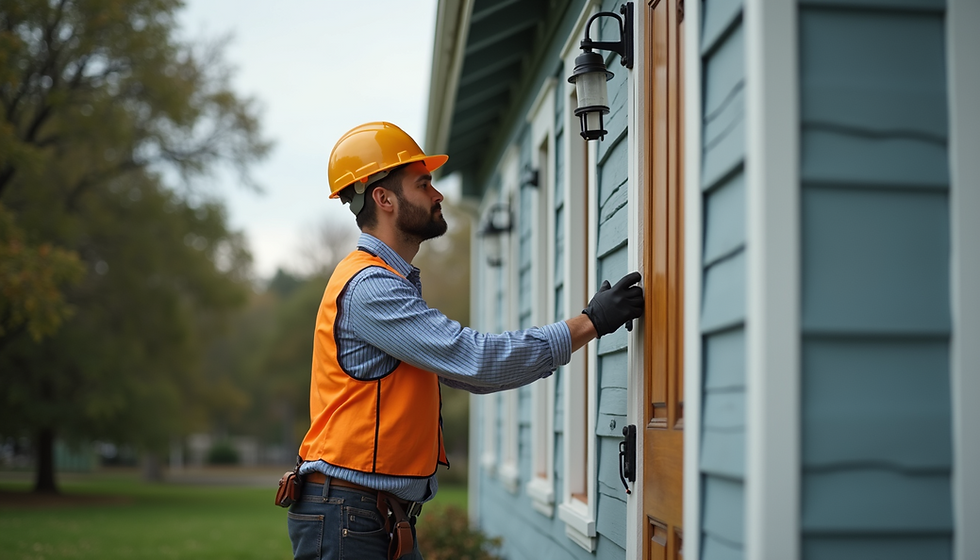The Importance of Inspecting Your Home Before Buying
- David Lee
- Jul 21, 2025
- 4 min read
Buying a home is one of the biggest financial decisions you'll ever make. With so much at stake, ensuring that the property is in good condition is crucial. This is where a thorough home inspection comes into play. A home inspection helps uncover potential issues that could lead to costly repairs later on. In this blog post, we will explore why it's essential to inspect your home before making a purchase.
Understanding the Importance of Home Inspection
When you find a house you love, it’s easy to get swept up in emotions and skip the inspection. However, neglecting this step can have serious consequences. According to the National Association of Realtors, nearly 90% of home buyers choose to have an inspection before completing the sale. This statistic highlights how critical home inspections are in the buying process.
A home inspection allows buyers to make informed decisions. It helps identify structural, electrical, plumbing, and safety issues. Addressing these problems before closing can often lead to better negotiation opportunities, making you aware of potential costs before they become your responsibility.

The Financial Impact of Skipping an Inspection
Purchasing a home without an inspection can be a financial gamble. Imagine moving in only to discover that the roof needs replacing, or there are foundation issues that could amount to thousands of dollars in repairs. Researchers have found that the average cost of a home inspection is around $300 to $500, a small price compared to the potential costs of unforeseen repairs.
In fact, a report from Zillow indicates that homeowners can spend anywhere from $5,000 to $15,000 on unexpected repairs in the first year alone. If you had inspected the home initially, many of these expenses could have been mitigated, or at least budgeted for effectively.
What is a Typical Home Inspection?
A typical home inspection covers various components of the house. During this assessment, a certified professional evaluates the condition of the structure and systems. This includes checking roofs, gutters, HVAC systems, electrical panels, plumbing, and more.
The inspector will provide a full report detailing their findings. Here’s a breakdown of what you can expect during an inspection:
Exterior Assessment: Inspectors check for issues with siding, windows, doors, and the foundation.
Interior Evaluation: This includes examining walls, ceilings, floors, and any visible signs of water damage.
Mechanical Systems: Evaluations of the HVAC systems, plumbing, and electrical systems are critical to ensure safety and functionality.
Safety Features: Inspectors look for smoke detectors, carbon monoxide detectors, and proper fire escapes.
By understanding these facets, you can approach the inspection process with a clearer mindset.

Potential Red Flags to Watch For
While many homes may look perfect from the outside, some red flags might indicate deeper issues. Here are a few warning signs you should be aware of during the inspection:
Water Stains: Signs of water damage can indicate roof leakage or plumbing issues.
Cracks in Walls or Foundation: These might be signs of structural problems that can be costly to repair.
Old Electrical Systems: Outdated wiring can be a fire hazard and may need complete replacement.
Pest Infestations: Signs of termites or other pests can compromise the integrity of the home.
If you spot any of these issues during the inspection, it's essential to address them with your real estate agent. They may require further expert evaluation and remediation before finalizing a purchase.
Choosing the Right Inspector
Selecting the right home inspector is vital for a thorough evaluation. Here are tips on how to find a reputable inspector:
Ask for Recommendations: Start with friends, family, or your real estate agent. Personal recommendations are often the most reliable.
Check Credentials: Look for inspectors who are members of professional organizations, such as the American Society of Home Inspectors (ASHI).
Review Sample Reports: A good inspector should provide you with a sample report that reflects their thoroughness and attention to detail.
Interview Candidates: Don’t hesitate to ask questions about their experience, tools, and approach to inspections.
Once you’ve selected an inspector, attend the inspection if possible. This will give you the opportunity to ask questions and understand any concerns that may arise directly.

Making the Most of Your Inspection
After the inspection is completed, you will receive a detailed report. Here’s how to effectively utilize this information:
Review the Report Thoroughly: Go through all details carefully, noting any urgent issues versus minor repairs.
Consult with Professionals: If significant issues arise, consult professionals for estimates on repairs. This will help in negotiations with the seller.
Negotiate Repairs: You can use the inspection findings to negotiate repairs or a price reduction with the seller.
It’s crucial to approach negotiations with empathy. Sellers might be unaware of issues in their home, and being understanding can work towards a successful resolution.
Navigating the Final Steps
Once the home inspection is complete, and you've addressed any concerns with the seller, you’re well on your way to closing. Make sure you keep copies of all inspection reports, repair estimates, and any agreements made during negotiations. These documents could prove invaluable in the future if issues arise post-purchase.
In summary, a home inspection can mean the difference between a happy homeownership experience and a financial burden. Investing in a thorough inspection can save you time, money, and stress, making your home-buying journey a success.
If you're ready to take the first step in ensuring your future home is safe and sound, consider scheduling a professional home inspection today.









Comments